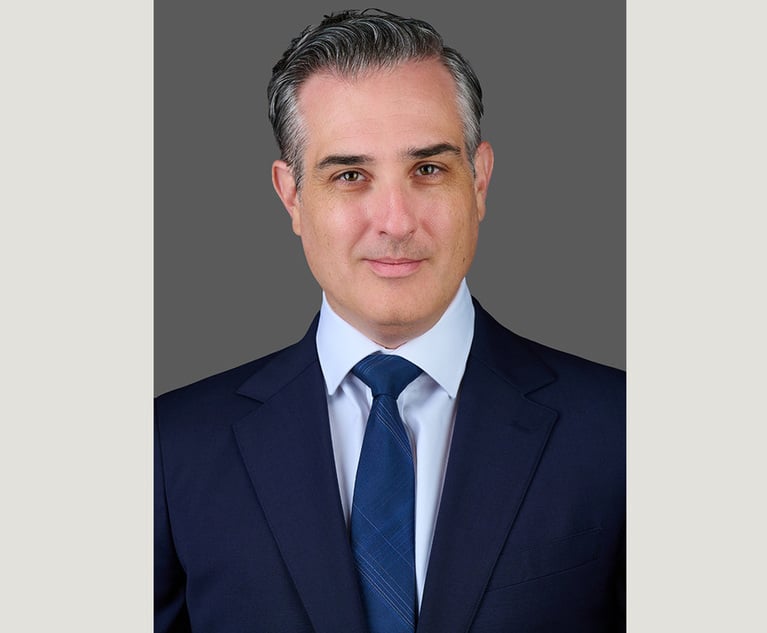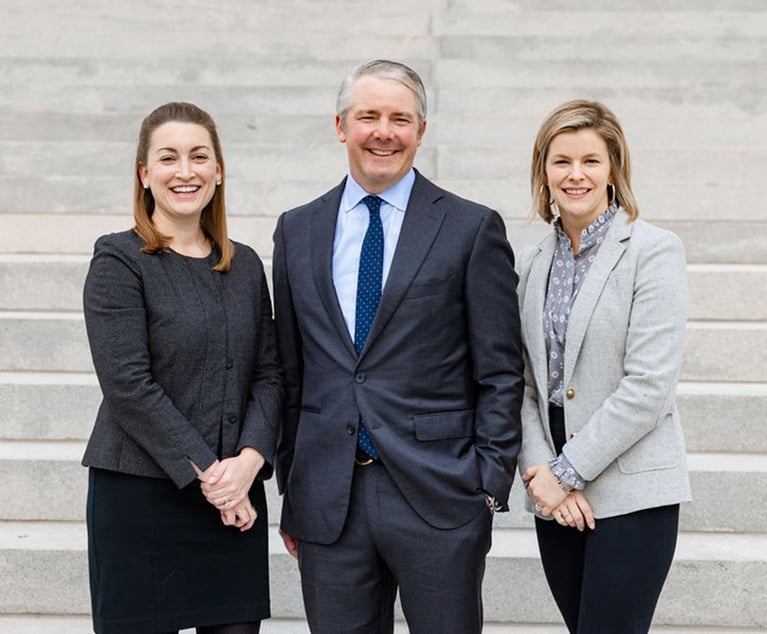 Credit: Min C. Chiu/Shutterstock.com
Credit: Min C. Chiu/Shutterstock.comPa. Justices Agree to Examine Discovery Rule for Legal Mal Actions
The Pennsylvania Supreme Court appears poised to decide whether an attorney's continued representation of a client following an alleged occurrence of legal malpractice should toll the statute of limitations for bringing a malpractice claim.
January 30, 2020 at 04:30 PM
5 minute read
The Pennsylvania Supreme Court appears poised to decide whether an attorney's continued representation of a client following an alleged occurrence of legal malpractice should toll the statute of limitations for bringing a malpractice claim.
In a one-page order Jan. 28, the justices granted allocatur in Clark v. Stover, agreeing to review an August 2019 decision by a unanimous three-judge state Superior Court panel that dismissed as untimely a legal malpractice case against Centre County attorney Jeffrey Stover.
The case hinges on the questions of whether and when the plaintiff, David Clark, could have or should have known he had a potential malpractice claim against Stover.
Although Clark had cited a 2015 letter from Stover, which he claimed showed the attorney fraudulently concealed his allegedly negligent conduct in an underlying will dispute, Superior Court Judge Correale Stevens, who wrote the court's 23-page opinion, said that, "as a matter of law," the letter did not establish fraudulent concealment.
"The letter provides no evidence of an unintentional or intentional act of concealment or that attorney Stover somehow, through fraud or concealment, caused the Clarks to relax their vigilance to inquire about the breaches allegedly committed by him during the underlying litigation," Stevens said.
Stevens was joined by Judges Anne Lazarus and Mary Murray.
According to Stevens, Clark retained Stover in 2008 to bring a claim alleging that his brother suffered from undue influence during the execution of his will. Clark and his mother, Monica Clark, who later became a plaintiff in the legal malpractice action, agreed to initially pay Stover $25,000.
The Clarks, according to Stevens, alleged that Stover advised Monica Clark that she should not pursue legal action in the underlying claim, saying it would have barred other claims she may want to bring, and that Stover said the Clarks could pursue a claim against a related insurance carrier, but the attorney never pursued this action. The Clarks also contended that, during trial in the underlying dispute, Stover called a psychiatric witness with no previous experience as an expert witness. The Clarks asserted that the witness, who was supposed to testify about the impact of alcoholism on the decedent, testified that the case marked the only evaluation he had ever done where he had not met the subject.
The trial judge severely discounted the expert's testimony, and the will dispute was eventually tossed. However, according to the Clarks' allegations, Stover advised them to appeal to the state Superior Court and then the Supreme Court—both of which were denied.
The Clarks, Stevens said, allegedly spent a total of about $50,000, and Monica Clark allegedly gave Stover her diamond ring and diamond wrist watch to continue pursuing the claims.
Monica Clark also again retained Stover to pursue a separate claim involving the disputed estate, paying Stover about $10,000, according to the allegations. That was also dismissed, after the judge determined it was not brought within the applicable two-year statute of limitations.
The Clarks sued in 2015, raising claims of negligence and breach of contract. However, the trial court dismissed the claims, finding they were not brought within the statute of limitations.
The Superior Court panel agreed, saying that, although the Clarks did not identify specific dates for Stover's alleged breaches, the allegedly inappropriate conduct would not have happened later than Nov. 10, 2009, since that was the date the trial court dismissed the claims in the underlying will dispute. According to Stevens, that meant the Clarks had until 2011 to file their negligence claims and until 2013 to file their breach of contract claims.
Stevens also dismissed arguments that a jury should decide the statute of limitations issue based on recent Supreme Court precedent outlined in Nicolaou v. Martin, which the Superior Court cited in a revival of a decades-old priest abuse claim in June. The judge said that the plaintiffs' "lack of understanding, lack of knowledge or mistake about the meaning" of the judge's decisions or the attorney's actions did not stop the clock on the statute of limitations.
"Here, viewing the record in the light most favorable to the Clarks, there is no genuine issue of material fact that their legal malpractice claims were reasonably discoverable when Judge [Daniel] Milliron rendered his decision in the underlying will contest case," Stevens said. "At this point, they possessed 'sufficient critical facts to put [them] on notice that a wrong [by attorney Stover]' may have been committed."
In its Jan. 29 order granting allocatur, the Supreme Court agreed to consider a single issue, as phrased by Clark: "If an attorney ongoing [sic] represents a client post-occurrence of legal malpractice, should that continuing representation otherwise toll the statute of limitations?"
Attorney Matthew Weisberg of Weisberg Law represented the Clarks and said in an email, "[W]e believe the adoption of the continuing representation rule will be to the benefit of all: attorneys, insurers, clients, and the judiciary."
"In all, however, my having recently appeared before the United States Supreme Court and soon to now appear before the Pennsylvania Supreme Court has taught me: clients at large generally do not care about setting precedent—they care about winning," Weisberg continued. "We look forward to presenting our case to the Pennsylvania Supreme Court towards hopefully obtaining a reversal for remand to trial on the merits."
Marshall Dennehey Warner Coleman & Goggin attorney Kimberly Boyer-Cohen represented Stover and declined to comment.
This content has been archived. It is available through our partners, LexisNexis® and Bloomberg Law.
To view this content, please continue to their sites.
Not a Lexis Subscriber?
Subscribe Now
Not a Bloomberg Law Subscriber?
Subscribe Now
NOT FOR REPRINT
© 2025 ALM Global, LLC, All Rights Reserved. Request academic re-use from www.copyright.com. All other uses, submit a request to [email protected]. For more information visit Asset & Logo Licensing.
You Might Like
View All

'Taking the Best' of Both Firms, Ballard Spahr and Lane Powell Officially Merge
6 minute read

Law Firms Mentioned
Trending Stories
Who Got The Work
Michael G. Bongiorno, Andrew Scott Dulberg and Elizabeth E. Driscoll from Wilmer Cutler Pickering Hale and Dorr have stepped in to represent Symbotic Inc., an A.I.-enabled technology platform that focuses on increasing supply chain efficiency, and other defendants in a pending shareholder derivative lawsuit. The case, filed Oct. 2 in Massachusetts District Court by the Brown Law Firm on behalf of Stephen Austen, accuses certain officers and directors of misleading investors in regard to Symbotic's potential for margin growth by failing to disclose that the company was not equipped to timely deploy its systems or manage expenses through project delays. The case, assigned to U.S. District Judge Nathaniel M. Gorton, is 1:24-cv-12522, Austen v. Cohen et al.
Who Got The Work
Edmund Polubinski and Marie Killmond of Davis Polk & Wardwell have entered appearances for data platform software development company MongoDB and other defendants in a pending shareholder derivative lawsuit. The action, filed Oct. 7 in New York Southern District Court by the Brown Law Firm, accuses the company's directors and/or officers of falsely expressing confidence in the company’s restructuring of its sales incentive plan and downplaying the severity of decreases in its upfront commitments. The case is 1:24-cv-07594, Roy v. Ittycheria et al.
Who Got The Work
Amy O. Bruchs and Kurt F. Ellison of Michael Best & Friedrich have entered appearances for Epic Systems Corp. in a pending employment discrimination lawsuit. The suit was filed Sept. 7 in Wisconsin Western District Court by Levine Eisberner LLC and Siri & Glimstad on behalf of a project manager who claims that he was wrongfully terminated after applying for a religious exemption to the defendant's COVID-19 vaccine mandate. The case, assigned to U.S. Magistrate Judge Anita Marie Boor, is 3:24-cv-00630, Secker, Nathan v. Epic Systems Corporation.
Who Got The Work
David X. Sullivan, Thomas J. Finn and Gregory A. Hall from McCarter & English have entered appearances for Sunrun Installation Services in a pending civil rights lawsuit. The complaint was filed Sept. 4 in Connecticut District Court by attorney Robert M. Berke on behalf of former employee George Edward Steins, who was arrested and charged with employing an unregistered home improvement salesperson. The complaint alleges that had Sunrun informed the Connecticut Department of Consumer Protection that the plaintiff's employment had ended in 2017 and that he no longer held Sunrun's home improvement contractor license, he would not have been hit with charges, which were dismissed in May 2024. The case, assigned to U.S. District Judge Jeffrey A. Meyer, is 3:24-cv-01423, Steins v. Sunrun, Inc. et al.
Who Got The Work
Greenberg Traurig shareholder Joshua L. Raskin has entered an appearance for boohoo.com UK Ltd. in a pending patent infringement lawsuit. The suit, filed Sept. 3 in Texas Eastern District Court by Rozier Hardt McDonough on behalf of Alto Dynamics, asserts five patents related to an online shopping platform. The case, assigned to U.S. District Judge Rodney Gilstrap, is 2:24-cv-00719, Alto Dynamics, LLC v. boohoo.com UK Limited.
Featured Firms
Law Offices of Gary Martin Hays & Associates, P.C.
(470) 294-1674
Law Offices of Mark E. Salomone
(857) 444-6468
Smith & Hassler
(713) 739-1250





